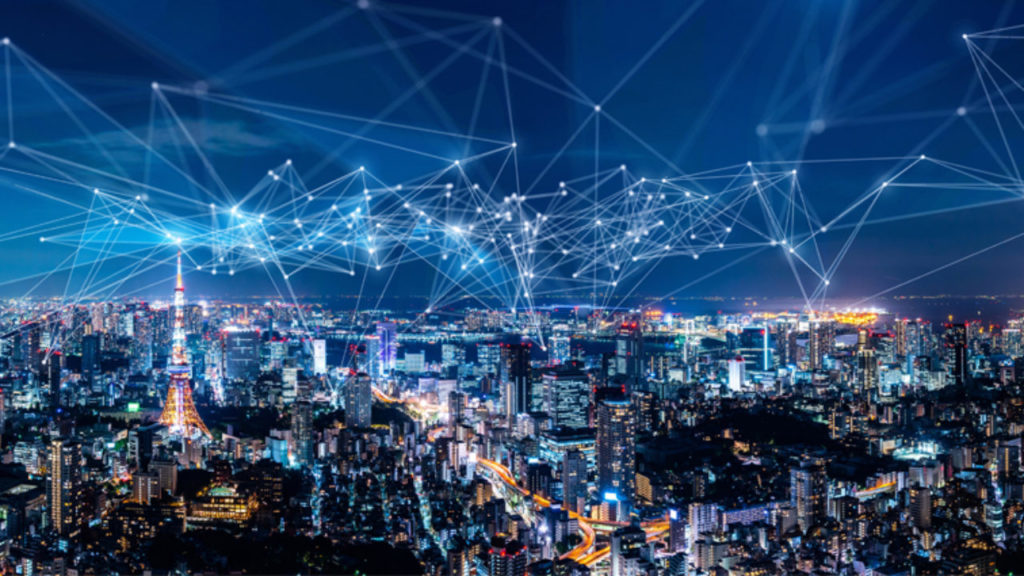Sam Hoey, Lead Designer at Designit and Dr Timothy Pape, Architect and Urban Cultural Theorist at Hidden Strategy HS in cooperation with Designit
For some, the metaverse is seen as the technological promise of a decentralised creative world which safeguards the fair distribution of property (blockchain) and promotes a fairer society; for others, it is simply another successful business model from existing tech giants. However, it is precisely this gap in common understanding which is most telling, as it emphasises the true potential of the metaverse for cities and local governments looking to innovate.
For instance, the metaverse is most commonly viewed as a digital parallel universe, which is fully immersive, but ultimately separate from the physical world. However, another, arguably more realistic view of the metaverse is the opportunity it creates for connected worlds.
In our work at Designit we approach it within a framework of things being done ‘from’ the metaverse – i.e. solving existing problems in new ways from the metaverse, or things being ‘for’ the metaverse – i.e. new problems and opportunities that only exist because of the metaverse being solved for the metaverse.
For urban planning, the metaverse provides a way to simulate urban development in an open platform and collaboratively develop solutions to challenges like urban heat islands, air pollution, transportation, and community services.
But no best case scenario is worth entertaining without also considering the potential challenges. To access the metaverse people need a device and enough internet bandwidth to connect to it, so when thinking of the infrastructure that needs to be in place to optimise the use of the metaverse in cities and local governments, it is likely that both physical and non-physical structures will be required. Otherwise, the metaverse has the potential to increase the existing digital divide and inequalities in our cities.
The metaverse offers up an evolving domain through which conceptual urban planning and envisionment can take place, allowing greater opportunities for modelling and simulating, transforming visions for urban spaces into digital realities. One great benefit that we could see from the metaverse being used is increased empathy in the planning process, as urban planners and government officials can better immerse themselves in the roles and experiences of others, creating greater understanding and context for future developments.
The use of the ‘virtual’ is not new to architects and urban planners. It is a practice they have been using for more than 20 years to draw and develop every urban construction, which means that there is already an incredible treasure trove of data on virtual worlds that need only be applied in the context of the metaverse. Additionally, we also see many initial projects incorporating ‘augmented reality’ (AR) as a tool in their urban planning processes.
The metaverse presents new opportunities for people living in these cities too. Imagine a future where community members can interact “face-to-face” with building department personnel on the plans for their new shopping centre from the comfort of their own homes or even comment at a virtual public meeting from their office chairs. The great thing is, the technology and vision to create these kinds of virtual spaces is already here and has come about alongside the development of Web3 technologies.
A great example of this is in Seoul, South Korea, which has been working to use the metaverse to improve city services, enhance administration, and integrate digital platforms, to create a truly smart city. In 2021, the city announced that it would invest $3.3 million as part of a five-year master plan to provide services to its residents in the metaverse. In Seoul’s “Metaverse 120 Center” residents will meet with avatar public officials in a virtual office for public services previously only available in person at City Hall. Along with transitioning government services to the metaverse, Seoul is introducing a virtual tourist zone which will host some of Seoul’s largest tourist attractions virtually. Seoul’s most popular festivals will be held in the metaverse, starting with a traditional Bosingak bell-ringing ceremony on New Year’s Eve.
While Seoul and its ‘smarter city’ plans could prove to be a fantastic roadmap to local government administrators looking to enhance their capabilities, improve the provision of their services and engage more personally with their residents, the first step for government officials and city leaders must be to take special care in understanding the barriers for residents in accessing the foundational technologies and real-life infrastructure needed to access the metaverse and its benefits.









